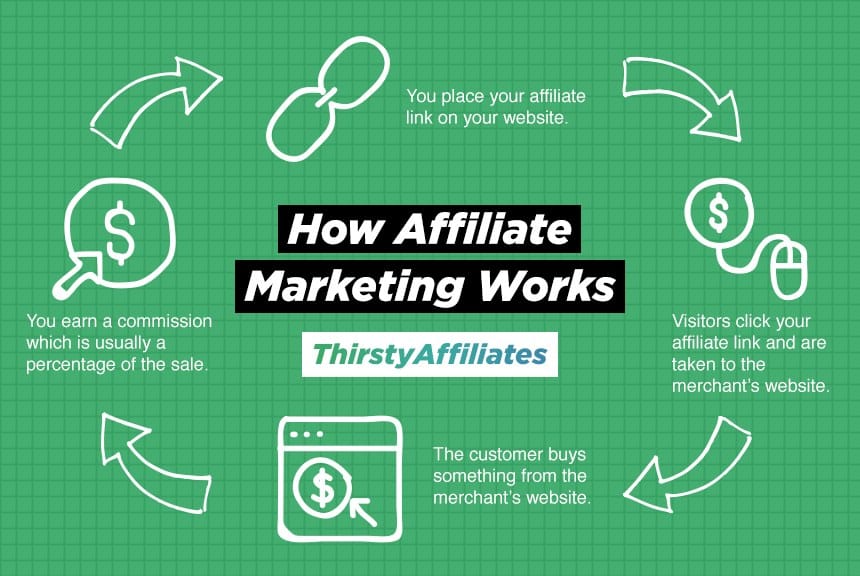Inhalt

Affiliate-Marketing ist ein lukratives Unterfangen, das als Nebenerwerb oder sogar als Haupteinkommensquelle dienen kann. Allerdings müssen Sie zunächst einen Platz einrichten, um Ihre Produktlinks zu bewerben. Wenn Sie bei Null anfangen, fragen Sie sich vielleicht, ob Sie eine Website brauchen, um mit dem Affiliate-Marketing zu beginnen.
Die Erstellung einer Website für Ihre Marketingbemühungen kann einen zentralen Ort für Ihre Links bieten und Ihnen helfen, Besucher und Konversionen anzuziehen. Aber das ist nicht die einzige Möglichkeit. Andere Vermarkter nutzen stattdessen Social-Media-Plattformen und Online-Foren, um für ihre Links zu werben.
In diesem Beitrag werden wir die Vor- und Nachteile der Verwendung einer Website für das Affiliate-Marketing untersuchen. Wir werden auch einige alternative Affiliate-Kanäle besprechen und Ihnen bei der Entscheidung helfen, welcher Ansatz für Ihre Bedürfnisse am besten geeignet ist. Fangen wir an!
Eine Einführung in das Affiliate Marketing
Affiliate-Marketing ist ein Zweig der Werbung, der es Ihnen ermöglicht, Geld zu verdienen, indem Sie für die Produkte eines Unternehmens werben. Als Affiliate-Vermarkter verdienen Sie jedes Mal eine Provision, wenn ein Kunde einen Artikel über einen Ihrer Links kauft:

Affiliate Marketing wird oft als passives Einkommen weil Sie nicht aktiv Produkte entwerfen oder verkaufen müssen. Stattdessen können Sie Inhalte erstellen die Produkte empfiehlt und Links von Ihren Affiliate-Partnern enthält.
Affiliate-Marketing kann ein lukratives Unterfangen sein, und es lohnt sich $8,2 Milliarden allein auf dem US-Markt. Obwohl viele Vermarkter Links über Blogs und Websites fördern, gibt es Alternativen. Wir werden uns diese Optionen im nächsten Abschnitt genauer ansehen.
Die Vor- und Nachteile der Erstellung einer eigenen Website für Affiliate Marketing
Es gibt verschiedene Möglichkeiten, um Affiliate-Links ohne eigene Website bewerben, einschließlich:
- Soziale Medien: Plattformen für soziale Medien wie Facebook und Twitter können Sie Affiliate-Links in Ihren Beiträgen und Profilen teilen.
- Erstellung eines E-Books: Sie können hilfreiche Inhalte in Ihrem Fachgebiet erstellen und URLs zu Partnerprodukten hinzufügen.
- Nutzung von Foren und Online-Gemeinschaften: Eine der besten Möglichkeiten, für Produkte und Dienstleistungen zu werben, ist Online-Communities und Foren. Sobald Sie beigetreten sind, müssen Sie ein aktives Mitglied sein, um das Vertrauen der anderen Mitglieder zu gewinnen.
- YouTube-Videos erstellen: YouTube ist eine der beliebtesten Plattformen für die Bewerbung von Affiliate-Produkten, denn Sie können Artikel und ihre Links in Videos einfügen.
Aber auch die Erstellung einer Website für das Affiliate-Marketing ist ein beliebter Ansatz. Schauen wir uns einige der Vor- und Nachteile an.
Profis
Hier sind einige der Vorteile der Erstellung einer speziellen Website für Affiliate-Marketing:
- Budgetfreundlich: Die Erstellung und der Betrieb einer Website muss nicht teuer sein, wenn Sie sich für eine günstiges Webhosting-Unternehmen und eine kostenlose Inhaltsverwaltungssystem (CMS) wie WordPress.
- Größere Reichweite: Verwendung von Taktiken zur Suchmaschinenoptimierung (SEO)können Sie in den Google-Rankings nach oben klettern und mehr Besucher auf Ihre Partner-Website locken.
- Glaubwürdigkeit: Eine detaillierte Website mit hochwertigen Inhalten kann den Lesern versichern, dass Sie eine seriöse Quelle mit glaubwürdigen Produktempfehlungen sind.
Am wichtigsten ist vielleicht, dass der Betrieb einer Website Ihnen die Möglichkeit gibt, Ihre Inhalte zu diversifizieren. Sie können Affiliate-Links einbinden in Blogeinträge, Übersichtsartikel, spezielle Produktbewertungen, Ressourcen-Seitenund mehr:

Später in diesem Beitrag werden wir kurz darauf eingehen, wie man eine Website für das Affiliate-Marketing erstellt. Lassen Sie uns jetzt über einige der möglichen Nachteile dieses Ansatzes sprechen.
Nachteile
In erster Linie müssen Sie Ihre Website regelmäßig pflegen. Dazu gehören technische Aufgaben wie die Aktualisierung der Software Ihrer Website und die Optimierung der Suchmaschinenoptimierung. Außerdem sollten Sie Ihre Inhalte regelmäßig aktualisieren, um sie frisch und relevant zu halten.
Außerdem kann es zeitaufwendig sein, URLs einzufügen und ihre Leistung zu verfolgen. Aus diesem Grund empfehlen wir Investitionen in Link-Cloaking-Software zu Auto-Link-Schlüsselwörter, fehlerhafte URLs korrigierenund behalten Sie die Leistung im Auge.
Wie Sie entscheiden, welcher Affiliate-Marketing-Ansatz der beste für Sie ist
Im Folgenden finden Sie einige Faktoren, die Sie bei der Entscheidung, ob Sie eine Website für das Affiliate-Marketing erstellen sollten, berücksichtigen sollten:
- Zeitplan: Sie müssen Zeit für die Pflege Ihrer Website und die Entwicklung Ihrer Affiliate-Marketing-Strategie aufwenden.
- SEO-Kenntnisse: Sie müssen Ihr SEO optimieren, wenn Sie organischen Traffic auf Ihre Partnerinhalte ziehen wollen.
- Technisches Fachwissen: Sie benötigen grundlegende technische Kenntnisse, um Ihre Website zu betreiben, Inhalte zu erstellen, Software zu aktualisieren und Ihre Website vor Sicherheitsbedrohungen zu schützen.
- Haushalt: Der Betrieb einer Website kann billig sein, aber es ist keine kostenlose Strategie wie die Nutzung sozialer Medien oder öffentlicher Foren.
Im Idealfall haben Sie die Zeit, eine Omnichannel-Affiliate-Marketing Ansatz. Dazu gehört das Betreiben einer Website, das Bewerben von Social-Media-Plattformen, das Ansprechen von Online-Foren und vieles mehr. Indem Sie Ihre Kanäle diversifizieren, können Sie so viele Kunden wie möglich erreichen.
Dieser Ansatz ist jedoch nicht für jeden möglich. Wenn Sie Budget- oder Zeitbeschränkungen haben, sollten Sie Ihre Bemühungen auf einen einzigen Kanal konzentrieren.
Wie Sie mit dem Aufbau Ihrer Affiliate-Marketing-Website beginnen
Aufbau Ihrer ersten Affiliate-Marketing-Website kann sich einschüchternd anfühlen, aber das muss es nicht. Sobald Sie einen Hosting-Anbieter auswählen und eine Domain-Namekönnen Sie mit dem Aufbau der Website beginnen.
Wir empfehlen dieses Video, das eine anfängerfreundliche Anleitung enthält:
Sie müssen direkt mit den Marken zusammenarbeiten oder sich Partnermarketing-Programme. Dann können Sie beginnen, Inhalte zu erstellen und für Ihre Links zu werben.
Wir empfehlen auch die Verwendung von WordPress-Plugins, um Ihr Affiliate-Marketing effektiver zu gestalten. Unser ThirstyAffiliates-Plugin ermöglicht es Ihnen, Ihre Affiliate-Links direkt von Ihrem WordPress-Dashboard aus einzurichten, anzupassen und zu verfolgen:

ThirstyAffiliates kann lange und unhandliche Affiliate-Links verschleiern um sie für Ihre Leser attraktiver und glaubwürdiger erscheinen zu lassen. Es kann Ihnen auch helfen Umleitungen einrichtenSie können die automatische Verknüpfung von Schlüsselwörtern nutzen, CSV-Daten importieren und vieles mehr.
Schlussfolgerung
Brauchen Sie eine Website, um mit dem Affiliate-Marketing zu beginnen? Die kurze Antwort lautet: Nein, aber sie ist hilfreich. Obwohl Sie sich ausschließlich auf soziale Medien und externe Plattformen konzentrieren können, kann dieser Ansatz Ihre Reichweite und Konversionen einschränken.
Wenn Sie eine eigene Website für das Affiliate-Marketing erstellen, können Sie Produkte mit verschiedenen Inhalten bewerben und ein größeres Publikum erreichen. Außerdem sind die technischen Kenntnisse und der Wartungsaufwand minimal, wenn Sie in eine hilfreiche Affiliate-Software investieren, wie zum Beispiel unsere ThirstyAffiliates-Plugin.
Haben Sie Fragen zu den ersten Schritten im Affiliate-Marketing? Lassen Sie es uns im Kommentarbereich unten wissen!
Wenn Ihnen dieser Beitrag gefallen hat, sollten Sie uns auf Twitter, Instagram, Facebook, Pinterestund LinkedIn! Und vergessen Sie nicht, sich im Box unten!



Eine Website ist nicht erforderlich, aber sie bietet Ihnen einen großen Vorteil. Sie können Tests durchführen, mehrere Landing Pages erstellen, verschiedene Angebote unter derselben Domain bewerben und Ihre Affiliate-Links tarnen. Das alles führt zu einer ordnungsgemäßen Nachverfolgung - und das kann zu höheren Konversionsraten führen.
Nun, manchmal brauchen Sie eine Website, um Affiliate-Produkte zu fördern, manchmal nicht. Es hängt tatsächlich ab. Ich sah so viele Menschen, die Tausende von Anhängern oder Abonnenten auf Facebook, youtube haben. Aber natürlich mit einer Website haben so viele Vorteile. Und die meisten Affiliate-Vermarkter wollen auch eine Website zu haben.
netter Beitrag Bruder leicht zu lesen Ich bin wirklich dankbar, dass du diesen coolen Beitrag teilst Ich brauche diese Art von Informationen Mach weiter Bruder und danke, du hast meinen Tag gemacht Kumpel
Danke, dass Sie so einen schönen Blog veröffentlichen,
Ich arbeite an Affiliate Marketing und das wird mir definitiv dabei helfen.
Ihre Sichtweise ist so erfrischend.
Danke, dass Sie einen so tollen Blog mit uns teilen! Er hat uns einen sehr guten Einblick in dieses Thema gegeben.
Ich arbeite im Bereich des Marketings, daher danke ich Ihnen für diese Informationen.